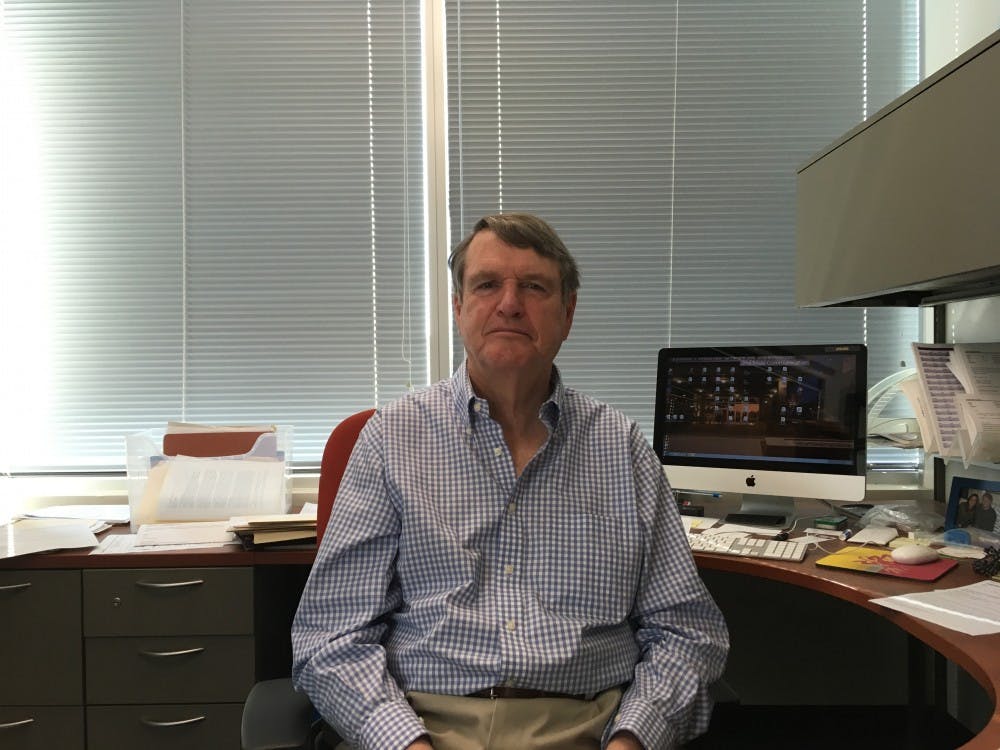President Donald Trump garnered strong reactions from ASU faculty and students for his tweet Feb. 17 calling the media the “enemy of the American people,."
The president’s tweet attacking the “FAKE NEWS media” also called out several conventional news sources and was met with dramatic reactions.
Sen. John McCain (R-Arizona) said on NBC’s Meet the Press one day later that suppressing the free press was “how dictators get started.” Fox News Anchor Chris Wallace said that the president “crossed the line,” while Trump supporters compared him to President Abraham Lincoln and President Thomas Jefferson — two who were often critical of the press.
The FAKE NEWS media (failing @nytimes, @NBCNews, @ABC, @CBS, @CNN) is not my enemy, it is the enemy of the American People!
— Donald J. Trump (@realDonaldTrump) February 17, 2017
With many in the field of politics and journalism reacting strongly to the comments, two ASU professors were more tempered with their assessment.
Professor Donald Critchlow, a history professor and director of the ASU Center for Political Thought and Leadership, said the phrasing from Trump is not as concerning as it is being made out to be.
“I thought it was overstated rhetoric,” Critchlow said. “But it also conveyed a general sentiment within large numbers – the majority of Americans – that the press can not be trusted to report accurately.”
Critchlow said he doesn’t believe we are as close to dictatorship as some have suggested.
“The fear that we’re on the verge of fascism or authoritarian reign in this country with Trump is absurd,” Critchlow said. “I do think that distrust of the press and political institutions and political leaders, combined with chaos – economic or political chaos – can lead to authoritarianism, but I don’t think we’re on the verge of Caesarism or authoritarian government at this point.”
Critchlow said the adversarial relationship between press and politicians was nothing new.
“In relations between the press and politicians, I think if you look at the history of this relationship you’ll find that the heated rhetoric toward the press … there’s a continuity,” Critchlow said. “Journalists, who aren’t often informed about history, … often want, in order to in part sell newspapers, will see greater acrimony.”
Critchlow said a trusted and objective press was vital to democracy. He said that the modern trend to be less trusting of professionals in every field could be corrosive to our democratic system.
“Ultimately, the press should play – in a democratic system – a role of earning the trust and restoring that trust of the American people,” Critchlow said. “Having a healthy, objective press is integral to a healthy democracy.”
Leonard Downie Jr., a professor of journalism at the Cronkite School and former executive editor and vice president of The Washington Post, said there is little reason to worry about a president’s words.
“I’m not concerned about what Trump says about the media, and people in the media should not be concerned with what Trump says about the media, they should just do their jobs well,” Downie said. “I would be concerned if the Trump administration took action like subpoenaing reporters or prosecuting government sources of reporters … taking unconstitutional legal action against the media – that would concern me.”
Downie said the adversarial nature of the Trump presidency shouldn’t deter students or professors from focusing on objectivity in their work.
“I’m not too concerned about that, I think that news coverage is more important than ever during this time and that’s what I’d tell journalism students,” Downie said.
Downie referenced Martin Baron, his successor at The Washington Post, who said in a commencement speech address that “no matter how nasty things get, we must keep doing our jobs.”
Ian Hugo, a journalism freshman, said that the tweet and president’s wording shocked him.
“First of all I think it’s extremely unprofessional for anyone to call the entirety of any (American group) the ‘enemy of the American people,’ especially the media, which is there to educate the American people and serve them in a way,” Hugo said. “As a freshman journalism student it offended me a little bit because I thought it was completely ridiculous.”
Hugo said he was not at all deterred by Trump’s words, but that he worries he may lose respect as a journalism major. He said, if anything, the comment made by Trump makes him want to go into journalism more.
“It just concerns me that maybe it can impact my reputation,” Hugo said.
Reach the reporter at maatenci@asu.edu or follow @mitchellatencio on Twitter.
Like The State Press on Facebook and follow @statepress on Twitter.




